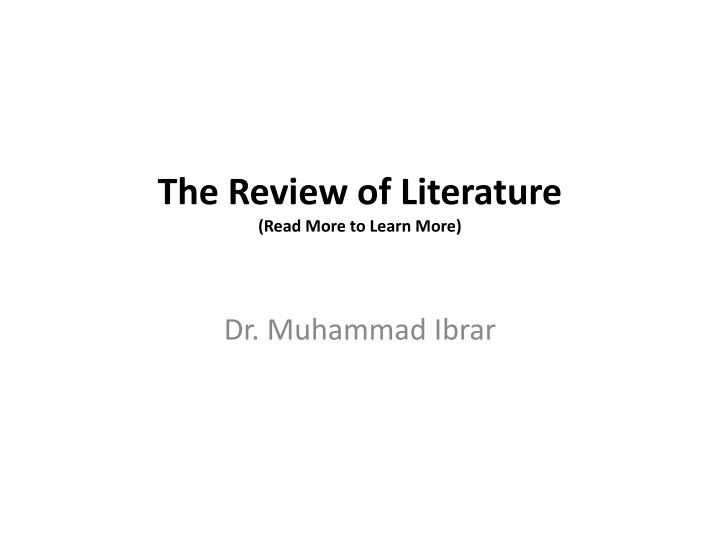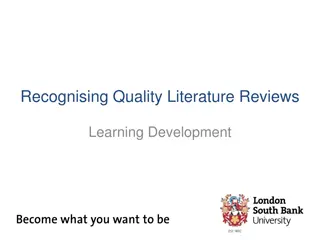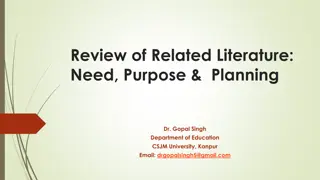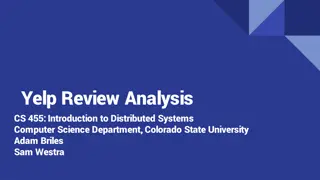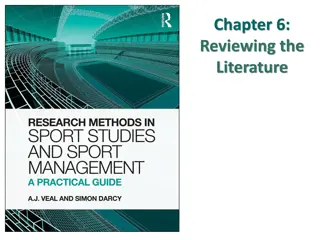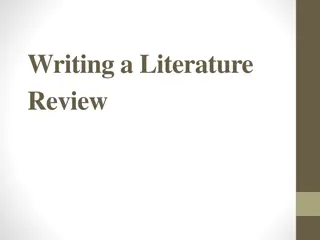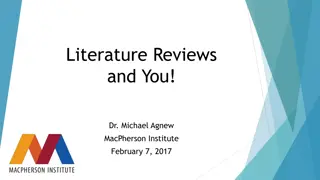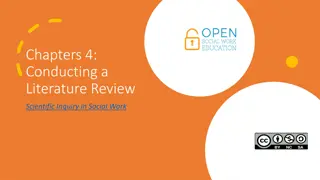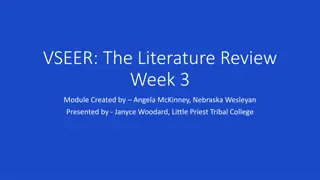Types and Purpose of Literature Reviews in Research
Literature review plays a crucial role in research by summarizing existing knowledge, theories, methodologies, and research gaps. Types include Evaluative, Exploratory, and Instrumental reviews, each serving a unique purpose. The main objective is to convey previous findings and establish a strong foundation for new research endeavors.
Download Presentation

Please find below an Image/Link to download the presentation.
The content on the website is provided AS IS for your information and personal use only. It may not be sold, licensed, or shared on other websites without obtaining consent from the author.If you encounter any issues during the download, it is possible that the publisher has removed the file from their server.
You are allowed to download the files provided on this website for personal or commercial use, subject to the condition that they are used lawfully. All files are the property of their respective owners.
The content on the website is provided AS IS for your information and personal use only. It may not be sold, licensed, or shared on other websites without obtaining consent from the author.
E N D
Presentation Transcript
The Review of Literature (Read More to Learn More) Dr. Muhammad Ibrar
Introduction Review of literature is one of the most important steps in the research process. It is an account of what is already known about a particular phenomenon. The main purpose of literature review is to convey to the readers about the work already done & the knowledge & ideas that have been already established on a particular topic of research. Literature review is a difficult task, but it is essential if the research process is to be successful.
Key points of a literature review Tell me what the research says (Theory) Tell me how the research was carried out (Methodology) Tell me what is missing or the gap that research aim to fill. (Research gap)
Types of Literature Review On the purpose of research there are three main types of literature review 1. Evaluative Review 2. Explorative Review 3. Instrumental Review
1. Evaluative Review Evaluative Review is a type of literature review which focus on providing a discussion of the literature in terms of its coverage and contribution to knowledge in particular area. It is often used to directly compare research findings of a project with other when findings are directly available.
2. Exploratory Review This type of literature review which is seeking to find out what actually exists in the academic literature in terms evidence and research methods as they relate to specific research topic and its related wider subject area. It is also used to sharpen, focus and identify research questions that remain unanswered in the specific topic. of theory, empirical
3. Instrumental Review This type of literature review which is seeking to find out how to conduct some research on a highly specific research problem. It is not designed nor to identify the state of current knowledge in an area but to identify the best way to carry out a research without acquire unnecessary and unavoidable cost.
Purpose of Literature Review The purpose of a literature review is to convey to the reader previous knowledge & facts established on a topic, & their strength & weakness. The literature review allows the reader to be updated with the state of research in a field & any contradictions that may exist with challenges findings of other research studies.
Contd. It helps to develop research investigative tools & to improve research methodologies. It also provide the knowledge about the problems faced by the previous researchers while studying same topic. Like put down a brick for building, Literature review enables to continue the tradition solid and to integrate past works and sources to the body of knowledge and also to say something new about them.
Contd. To identify gaps in theories To compare ones findings/ results with that of past studies and to place the work in the context To avoid duplication of work
Sources of Literature Review Electronic Database Books Journals News Papers and Magazines Conference Proceedings Theses/Dissertation Dictionary and Encyclopedia Research Reports
Points to be Considered for Review of Literature Be specific & be brief: Briefly state specific findings listed in methodologies used important points. Literature reviews are not the place for long quotes or in-depth analysis of each point. Be selective: Researcher should narrow down a lot of information into a small space for literature review. Just the most important points (i.e. those most relevant to the review s focus) must be mentioned in each work of review. an article, study, specific other in a or
Contd. Focus of current topics: Researcher needs to analyse points such as if it is a current article, & if not, how old it is: has its claims, evidence, or arguments been superseded by more recent work; if it is not current, then if it is important for historical background ; etc. Ensure evidence for claims: Researcher should focus on what support is given for claims made in literature. What evidence & what type of evidences are offered? Is the evidence relevant & sufficient? What arguments are given? What assumptions are made, & are they warranted?
Contd. Focus on sources of evidences: Researchers should ensure the reliability of the sources of the evidence or other information if they are from author s own experiments, surveys, historical records, government documents, etc. He should check how reliable those sources are. Reference citation: Any references cited in the literature review must be included in the bibliography. The common practice is that the reviewer does not list references in the bibliography that are not directly cited in the literature review or elsewhere in the paper /thesis.
Contd. Avoid abbreviations: Avoid technical terms & abbreviations. Simple & accurate sentence structure: A researcher should use simple sentences & must avoid errors of grammar & punctuation.
